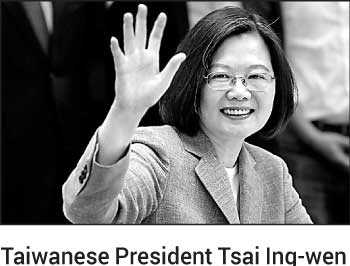Wednesday Feb 25, 2026
Wednesday Feb 25, 2026
Saturday, 13 July 2019 00:05 - - {{hitsCtrl.values.hits}}
 NEW YORK (Reuters) - Taiwanese President Tsai Ing-wen arrived in the United States on Thursday on a trip that has angered Beijing, warning that democracy must be defended and that the island faced threats from “overseas forces,” in a veiled reference to China.
NEW YORK (Reuters) - Taiwanese President Tsai Ing-wen arrived in the United States on Thursday on a trip that has angered Beijing, warning that democracy must be defended and that the island faced threats from “overseas forces,” in a veiled reference to China.
China, which claims self-ruled and democratic Taiwan as its own and views it as a wayward province, had called on the United States not to allow Tsai to transit there on her overseas tour.
“I want to reiterate that Taiwan is not, and will never, be intimidated,” Tsai told a reception in New York for representatives of Taipei’s 17 diplomatic allies, almost all small Central American, Caribbean or Pacific nations.
“The challenges we face only serve to strengthen our resolve to engage with the international community,” she said. “The 23 million people of Taiwan have a right to participate in international affairs and this right should not be subject to political preconditions.”
Tsai is spending four nights in the United States - two on the first leg and two on the way back from a visit to four Caribbean allies. She began her trip in New York and is expected to stop in Denver on her way back.
Shortly before Tsai was due to arrive at her Manhattan hotel, a Reuters photographer witnessed a brawl at the hotel’s entrance between dozens of pro-China and pro-Taiwan protesters, which was eventually broken up by police. The New York Police Department was not immediately able to comment on whether there had been any arrests.
Tsai was last in the United States in March, but her stops this time will be unusually long, as normally she spends just a night at a time in transit.
The U.S. State Department has said there had been no change in the U.S. “one-China” policy, under which Washington officially recognizes Beijing and not Taipei, while assisting Taiwan.
However, analysts said the extended stopovers served to emphasize the Trump Administration’s support for Tsai at a time when she has been coming under increasing pressure from Beijing, a major U.S. security rival with which Washington has been engaged in a year-long trade war.
Speaking before departure at Taipei’s main international airport at Taoyuan, Tsai said she would share the values of freedom and transparency with Taiwan’s allies, and was looking forward to finding more international space for Taiwan.
“Our democracy has not come easily and is now facing threats and infiltration from overseas forces,” Tsai said, without being specific.
“These challenges are also common challenges faced by democracies all over the world,” she said. “We will work with countries with similar ideas to ensure the stability of the democratic system.”